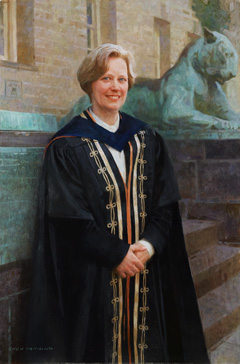Shirley Marie Tilghman
2001-2013
Shirley M. Tilghman was elected Princeton University's 19th president on May 5, 2001, and assumed office on June 15, 2001. An exceptional teacher and a world-renowned scholar and leader in the field of molecular biology, she served on the Princeton faculty for 15 years before being named president.
Tilghman, a native of Canada, received her Honors B.Sc. in chemistry from Queen's University in Kingston, Ontario, in 1968. After two years of secondary school teaching in Sierra Leone, West Africa, she obtained her Ph.D. in biochemistry from Temple University in Philadelphia.
During postdoctoral studies at the National Institutes of Health, she made a number of groundbreaking discoveries while participating in cloning the first mammalian gene, and then continued to make scientific breakthroughs as an independent investigator at the Institute for Cancer Research in Philadelphia and an adjunct associate professor of human genetics and biochemistry and biophysics at the University of Pennsylvania.
Tilghman came to Princeton in 1986 as the Howard A. Prior Professor of the Life Sciences. Two years later, she also joined the Howard Hughes Medical Institute as an investigator. In 1998, she took on additional responsibilities as the founding director of Princeton's multi-disciplinary Lewis-Sigler Institute for Integrative Genomics.
A member of the National Research Council's committee that set the blueprint for the U.S. effort in the Human Genome Project, Tilghman also was one of the founding members of the National Advisory Council of the Human Genome Project Initiative for the National Institutes of Health.
She is renowned not only for her pioneering research, but for her national leadership on behalf of women in science and for promoting efforts to make the early careers of young scientists as meaningful and productive as possible. She received national attention for a report on "Trends in the Careers of Life Scientists" that was issued in 1998 by a committee she chaired for the National Research Council, and she has helped launch the careers of many scholars as a member of the Pew Charitable Trusts Scholars Program in the Biomedical Sciences Selection Committee and the Lucille P. Markey Charitable Trust Scholar Selection Committee.
From 1993 through 2000, Tilghman chaired Princeton's Council on Science and Technology, which encourages the teaching of science and technology to students outside the sciences, and in 1996 she received Princeton's President's Award for Distinguished Teaching. She initiated the Princeton Postdoctoral Teaching Fellowship, a program across all the science and engineering disciplines that brings postdoctoral students to Princeton each year to gain experience in both research and teaching.
In 2002, Tilghman was one of five winners of the L’Oréal-UNESCO Award for Women in Science. In the following year, she received the Lifetime Achievement Award from the Society for Developmental Biology, and in 2007, she was awarded the Genetics Society of America Medal for outstanding contributions to her field and in 2022 the society’s George W. Beadle Award. Tilghman is a member of the American Philosophical Society, the National Academy of Sciences, the Institute of Medicine and the Royal Society of London, and is an Officer of the Order of Canada. She serves as a trustee of Amherst College, the Broad Institute of MIT and Harvard, the Institute for Advanced Study, the Simons Foundation and the Hypothesis Fund. She is a Fellow of the Corporation of Harvard College.

